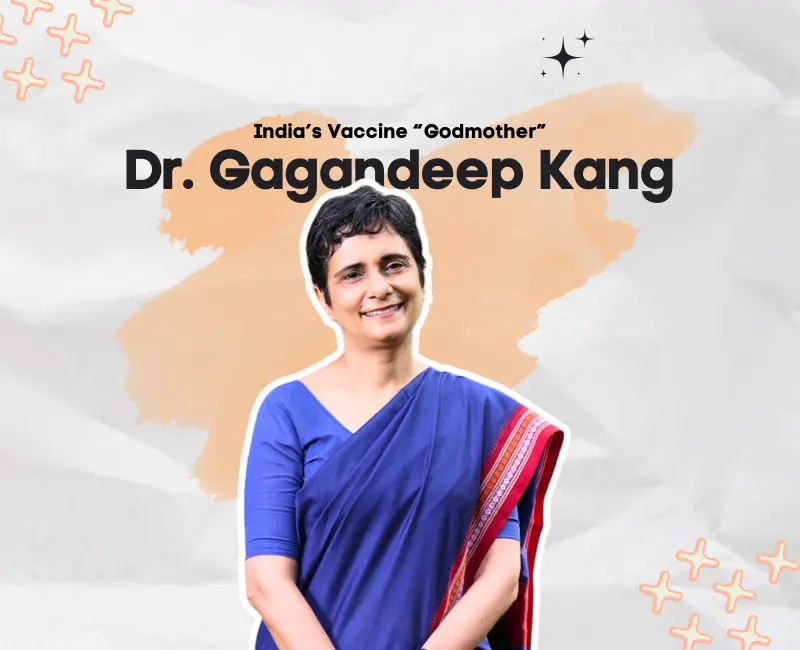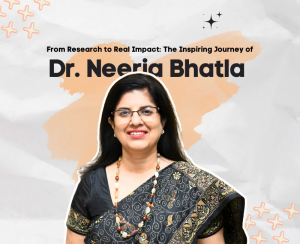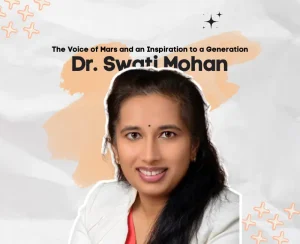India’s Vaccine “Godmother”: Dr. Gagandeep Kang

We all have heard about real-life heroes who have contributed to a greater cause. But only a few of them are recognized and gain fame across the globe. Meet Dr. Gagandeep Kang, often called the “vaccine godmother” of India, known for her groundbreaking work in shaping the country’s vaccine policy and improving public health. Her contributions have saved countless lives, especially those of children, and positioned India as a global leader in vaccine research and development.
She is currently the Director of Enteric, Diagnostics, Genomics, and Epidemiology in the Global Health division at the Bill & Melinda Gates Foundation, where she continues to lead efforts in global infectious disease research and vaccine development.
The Vaccine Visionary
Born in the quiet hill town of Shimla on 3 November 1962, Dr. Kang showed a natural affinity for science at an early stage. This early spark would evolve into a career marked by relentless research, compassionate leadership, and trailblazing achievements. Her passion was deeply fueled by her mother, an English teacher and her father, a mechanical engineer in the Indian Railways. Due to her father’s job Dr. Kang grew up across several cities of north and east India, even changed her school 10 times.
Recognizing her insatiable curiosity and thirst for knowledge, her father built her a small “home lab” when she was just 12 years old. This thoughtful gesture did more than just encourage a hobby; it ignited a lifelong passion for science. Surrounded by test tubes, wires, and simple equipment, she eagerly dove into hands-on experiments in biology, physics, and chemistry. In that humble setup, far from any formal lab, a young girl’s fascination with the natural world began to take shape.
The Journey to Science
Her academic journey is nothing short of exemplary. Gagandeep Kang pursued her medical education at the prestigious Christian Medical College (CMC), Vellore, one of India’s most respected institutions known for its excellence in both clinical practice and research. She earned her MBBS in 1987, followed by an MD in Microbiology in 1991, where she began to develop a deeper interest in infectious diseases and laboratory science. Driven by a desire to not just treat illness but understand it at the molecular level, she went on to complete her PhD in 1998, further cementing her commitment to medical research. These formative years at CMC shaped her scientific perspective, blending rigorous clinical training with cutting-edge microbiological research.
Early Research
After PhD Dr. Kang began her work on several infectious diseases, especially on illnesses that disproportionately affect children in low- and middle-income countries. She focused on enteric infections that are primarily spread through contaminated food or water. She was a prominent contributor rotavirus epidemiology and vaccinology in India. Dr. Kang saw this as both a scientific challenge and a moral responsibility. Rotavirus is one of most common and dangerous causes of diarrhea in infants and young children. Her work revealed critical insights: not only was rotavirus widespread in India, but the way children’s immune systems responded to it was significantly different from patterns seen in wealthier countries. These findings raised important questions about the effectiveness of existing vaccines and the need for solutions tailored specifically to Indian populations.
Her research wasn’t limited to rotavirus. She also studied other key pathogens like cholera, typhoid, and hepatitis, building a comprehensive understanding of how intestinal infections spread, how immunity develops in children, and how vaccines could be optimized to offer better protection. Through meticulous clinical trials, epidemiological studies, and laboratory work, Dr. Kang laid the foundation for a new era in public health research in India. Her led her to be esteemed as India’s “vaccine godmother”.
Academic and Institutional Leadership in India
Before taking on her current global role, Dr. Gagandeep Kang made significant contributions within India’s top medical and research institutions. She served as a Professor of Microbiology in the Department of Gastrointestinal Sciences at the Christian Medical College (CMC), Vellore, one of the country’s most respected medical schools. At CMC, she also directed the Wellcome Trust Research Laboratory, where she led critical research on enteric infections affecting children in low-income settings.
In addition to her work at CMC, Dr. Kang was appointed as the Executive Director of the Translational Health Science and Technology Institute (THSTI), an autonomous institute under India’s Department of Biotechnology. She was the first woman to lead THSTI, where she focused on building research capacity, promoting interdisciplinary collaboration, and advancing translational health innovations.
Leadership in Vaccine Research and Global Health Policy
Dr. Gagandeep Kang’s influence extends far beyond the laboratory. With more than 300 scientific publications to her name, she is widely recognized as a leading voice in infectious disease research. Her expertise has earned her positions on the editorial boards of prestigious journals such as PLoS Neglected Tropical Diseases, Current Opinion in Infectious Diseases, and Tropical Medicine and International Health.
Dr. Knag played a vital role in shaping health policy and guiding vaccine strategy both nationally and internationally. She has been an active member of numerous review panels for research funding agencies, evaluating projects that seek to combat infectious diseases worldwide. This includes India’s National Technical Advisory Group on Immunization (NTAGI) and the World Health Organization’s Global Advisory Committee on Vaccine Safety. Since 2015, Dr. Kang has chaired the WHO South-East Asia Regional Immunization Technical Advisory Group (SEAR ITAG), a key body advising on vaccination policies for millions of people in the region. Her global reach is further reflected in her honorary academic appointments as an associate faculty member at Johns Hopkins Bloomberg School of Public Health and adjunct professor at Tufts University School of Medicine in the United States.
One of Dr. Kang’s most notable achievements is her pivotal role in the development of Rotavac, India’s indigenous vaccine against rotavirus-induced diarrhea. She was among the lead researchers conducting Phase III clinical trials for the vaccine, helping to ensure its safety and effectiveness. Her early research helped establish laboratory methods essential for evaluating the vaccine’s effectiveness. More recently, she has contributed to global COVID-19 vaccine efforts as part of the WHO’s Strategic Advisory Group of Experts and supported India’s vaccine production initiatives. Through her leadership, Dr. Kang continues to bridge research and policy to improve public health on a global scale.
Notable Global Collaborations
Dr. Gagandeep Kang’s impact in vaccine research and public health has been strengthened by her collaborations with several prestigious global institutions and organizations. Beyond her work in India, she has partnered with the World Health Organization (WHO) on vaccine safety and immunization programs, contributing to regional and global strategies to reduce infectious diseases.
Her research collaborations have extended to institutions like the Johns Hopkins Bloomberg School of Public Health and Tufts University School of Medicine in the United States, where she holds honorary faculty positions. These partnerships have facilitated joint research projects, data sharing, and capacity building in vaccine science.
International collaborations also include work with global funding agencies and advisory groups such as the Bill & Melinda Gates Foundation and the Global Alliance for Vaccines and Immunization (Gavi), which have supported clinical trials and vaccine implementation studies in India. Through these connections, Dr. Kang has helped bridge gaps between local research needs and global health priorities.
Such partnerships have been instrumental in advancing vaccines like Rotavac, ensuring that Indian-developed vaccines meet international standards and reach children worldwide. Dr. Kang’s global network underscores the importance of cross-border cooperation in tackling diseases that affect millions, especially in low- and middle-income countries.
Awards and Accolades
Dr. Gagandeep Kang’s groundbreaking contributions to science and public health have earned her numerous national and international recognitions. She made history by becoming the first Indian woman elected as a Fellow of the Royal Society (FRS), one of the oldest and most prestigious scientific institutions in the world in 2019. This honor placed her among the ranks of scientific greats and highlighted the global significance of her work.
She is also a Fellow of the Indian Academy of Sciences, the Indian National Science Academy, and the National Academy of Medical Sciences, reflecting her outstanding impact on both clinical medicine and biomedical research in India.
In recognition of her leadership and dedication to public health, Dr. Kang has received multiple awards, including the Infosys Prize in Life Sciences (2016), one of India’s most prestigious science honors. She was also named among Nature’s 10 in 2020, a global list of ten people who significantly influenced science that year, particularly for her evidence-based voice during India’s COVID-19 response.
Conclusion
Dr. Gagandeep Kang’s journey is a powerful example of how science, when driven by purpose and compassion, can transform lives. From her early curiosity in a homemade lab to becoming a globally respected leader in vaccine research and public health, her career reflects unwavering dedication to improving the lives of the most vulnerable. Whether in the labs of CMC Vellore, at global health forums, or in policy-making circles, she has consistently championed evidence-based solutions and equitable healthcare. Dr. Kang continues to inspire future generations, proving that with curiosity, courage, and commitment, one can truly make a difference on a global scale.


